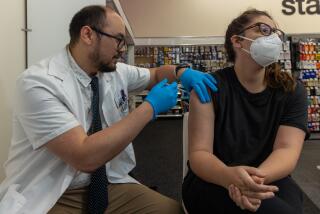Run--Don’t Walk--From Sick Folks
- Share via
Many of the winter respiratory illnesses caused by viruses are highly contagious, says Dr. Shirley Fannin, director of disease control for the county Department of Health Services. But that doesn’t mean you’re doomed to get sick with what people in your family or at work have come down with.
Most of the time, the contagion accompanies obvious symptoms. So, if you know someone who looks sick and acts sick, you should avoid him or her like the plague.
“During the time you are having symptoms, you are contagious,” Fannin says. “It usually lasts three to four days.”
The common cold starts with small, annoying symptoms but builds over a matter of days. You are contagious from the start.
Influenza spreads easily because the victim is contagious a few hours before the first symptom appears.
“The incubation period for influenza is very short,” Fannin says. “Influenza is contagious within a matter of a few hours before the onset of symptoms. You can be exposed today and, by tomorrow, be infected.”
If someone in your family has just come down with symptoms of the flu, you can quickly seek an antiviral medication, such as amantadine, to reduce your risk. This strategy works some of the time, Fannin says.
“This probably decreases the number of viruses,” she says, “but it doesn’t eliminate them.”
Bacterial illnesses, which include bronchitis and sinusitis and are usually identifiable by the yellow or green tinge of nasal or throat mucus, act a little differently than viruses, Fannin says.
“With bacterial illnesses, you can be contagious for longer periods of time if you don’t take antibiotics,” she says. “If you are taking antibiotics, you are probably not contagious after 24 hours.”
This is true even if you are still hacking and causing everyone in your office to say, “Ugh, go home!”
“The bacteria is killed off,” Fannin explains, “but you still have irritated and damaged tissue and that takes longer to heal.”
Also, bacterial illnesses do not travel through the air as easily as viral illnesses. Viruses spread like a Southern California wildfire because they permeate the air.
“Viruses are spread by airborne respiratory particles,” Fannin says. “When you cough or sneeze, you propel some tiny particles into the air. Because these particles are small, they hang suspended for long periods of time--for an hour or two. People who inhale that air inhale the particles.”
Gross.


